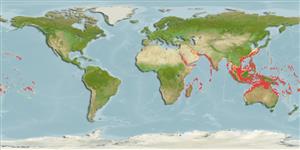Preferred temperature (Ref.
115969): 18.6 - 28.3, mean 25.1 (based on 608 cells).
Phylogenetic diversity index (Ref.
82804): PD
50 = 0.5000 [Uniqueness, from 0.5 = low to 2.0 = high].
Bayesian length-weight: a=0.00832 (0.00430 - 0.01608), b=3.13 (2.97 - 3.29), in cm Total Length, based on LWR estimates for this species & Genus-body shape (Ref.
93245).
Nível Trófico (Ref.
69278): 3.5 ±0.37 se; based on food items.
Resiliência (Ref.
120179): Baixo, tempo mínimo de duplicação da população 4,5 - 14 anos (Preliminary K or Fecundity.).
Prior r = 0.25, 95% CL = 0.14 - 0.47, Based on 1 stock assessment.
Fishing Vulnerability (Ref.
59153): Low to moderate vulnerability (29 of 100).
Climate Vulnerability (Ref.
125649): Moderate vulnerability (44 of 100).
